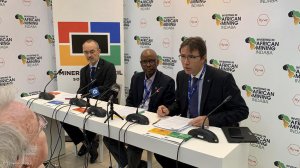CAPE TOWN (miningweekly.com) – Urgent steps are needed to revive the South African economy, Minerals Council South Africa chairperson Mxolisi Mgojo said on Monday.
Speaking on the first day of the four-day Investing in African Mining Indaba, he said the Minerals Council was ready and willing to work with the government.
“We believe that the time has come to be more assertive in conveying our position,” said Mgojo, who is also CEO of diversified mining company Exxaro Resources.
Needing urgent addressing, he said, were security of electricity supply and electricity running costs, corruption at State power utility Eskom and State-owned transport company Transnet, controlling public spending and controlling crime.
“We cannot stress the urgency enough,” he emphasised at the early morning media conference in which Mining Weekly participated.
Minerals Council South Africa CEO Roger Baxter said that mining was inextricably linked to the economy and did well when the economy did well.
Baxter decried what he described as “an unprecedented deterioration” in security and a rise in crime, with gold plants attacked in Gauteng and North West and cable theft resulting in inadequate rail capacity.
“We are not a military organisation,” said Baxter in reference to large groups of AK47-carrying criminal groups attacking mining operations.
He said South Africa was experiencing its longest economic downturn since 1945 and having to cope with massive public debt.
“Effectively, South Africa is going backwards,” he said, while conversely a rising economic tide would lift all boats.
Government needed to take urgent action to re-instil confidence and facilitate a return of investment. A far more austere fiscal budget was essential.
The Facts and Figures 2019 pocketbook distributed by Minerals Council South Africa chief economist Henk Langenhoven estimates that 2019 production in the mining sector contracted by 2.8% on 2018.
Although mining production saw some short-term improvement during the latter part of the year, the improvements were not strong or sustained enough to revise the outlook. Mining production has not improved significantly since 2009.
Structural and logistical constraints such as limited rail and harbour capacity, the increasing cost of, and disruptions in, electricity supply and, industrial action and community unrest are the main contributing factors.
Relentlessly rising input costs for mining in South Africa continue to be a threat to the sustainability of the sector. The Minerals Council estimates that input cost inflation for the mining sector was 7.6% during 2019, 2.9 percentage points above the national average production inflation rate. Rising electricity prices are a critical concern to the South African mining industry, while the sector depends directly and indirectly on government supplied infrastructure and services, amounting to R100-billion or 45% of intermediary input costs.
During 2019, the mining industry paid R8-billion for water (4% of input costs), R22-billion for electricity (10% of input costs), R71.6-billion for transport and storage which include harbours, rail and road (32% of input costs) and spent R34.6-billion on housing (22% of wages).
The cost of government supplied goods and services rose two percentage points faster than the headline consumer price index, and in some instances 4 percentage points higher than private sector induced cost escalation.
While employment levels stabilised during 2019, the small gains registered during 2019 stagnated towards the end of the year. The Minerals Council hopes that this trend is not a prelude to further job losses during 2020.
Gross fixed investment showed some improvement since the middle of 2018, following a period of stagnation from 2007, and a major decline between 2013 and a lower turning point in 2018. Net fixed investment after depreciation followed a similar trend, but at a lower level.
Notwithstanding the manifold challenges the industry is facing, mining continued to make a major contribution to the South African economy. In 2019, the mining industry:
- contributed R360.9-billion to gross domestic product (2018: R350.8-billion);
- contributed R94.7-billion to fixed investment (2018: R94.7-billion);
- sold R538.9-billion in primary mineral sales (2018: R475-billion);
- exported R348.2-billion in sales (2018: R312-billion);
- paid R8.6-billion in royalties (2018: R7.6-billion);
- paid R24.3-billion in taxes (2018: R22-billion);
- paid R32.9-billion in value added tax in terms of net outflow;
- paid R16-million in transfer duties;
- employed 454 861 people; and
- paid employees R135.9-billion (2018: R134.5-billion) and contributed R22.7-billion (2018: R21-billion) to personal income tax on behalf of employees.
Based on the latest available statistics, it was clear, said Langenhoven, that South African mining companies were struggling to ramp-up production in response to improved commodity prices owing to structural constraints such as the cost and unreliability of electricity supply.
“We know that the South African mining industry has significant economic and transformational potential. Unlocking this potential will require a concerted effort from all stakeholders to address the structural and policy constraints that are negatively impacting the performance of an industry which remains the flywheel of the South African economy,” said Langenhoven.
EMAIL THIS ARTICLE SAVE THIS ARTICLE ARTICLE ENQUIRY
To subscribe email subscriptions@creamermedia.co.za or click here
To advertise email advertising@creamermedia.co.za or click here










